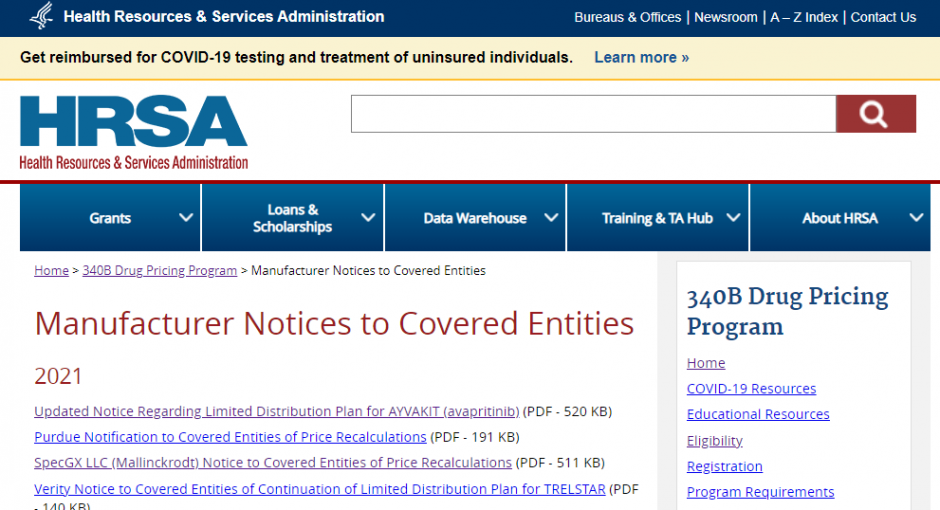For the fourth time since 2020, Purdue Pharma has announced refunds to 340B covered entities for overcharges. Purdue, which pled guilty in November in federal court to fraud and kickback charges related to its role in fueling the national opioid-abuse epidemic, said it would be providing refunds or credits for the painkillers OxyContin, Butrans and Hysingla as well as for the insomnia drug Intermezzo. The drugs were either produced by Purdue or its subsidiary Avrio Health.
The refunds, which were posted on the U.S Health Resources and Services Administration’s Office of Pharmacy Affairs web site, will cover all of calendar year 2019. Purdue said in its notice that Apexus would handle refunds and credits to covered entities through its drug wholesalers.
Meanwhile, Mallinckrodt Pharmaceuticals and its subsidiary SpecGx has announced it will be refunding covered entities for a variety of opioid painkillers and nervous system stimulants for the period of first quarter 2017 through the first quarter 2020. It will automatically issue any refunds of $40 and over.
Mallinckrodt, which was once the nation’s leading seller of opioids, filed for bankruptcy protection in October in an effort to protect itself from an onslaught of federal, state and local government lawsuits.
The products include certain formulations of oxycodone, codeine, hydrocodone, methadone and methylphenidate, which is used to treat narcolepsy and ADHD.
No Financial Relief for Top Selling Drug Despite Settlement over Medicaid Underpayments
Interestingly, the medications included in the refund notice do not include the company’s top selling product, Achtar Gel, used to treat multiple-sclerosis. In October, Mallinckrodt announced it was settling with the U.S. Department of Justice for $260 million over allegations the company evaded paying additional Medicaid rebate amounts due when a drug’s average manufacturer price (AMP) rises faster than inflation. The same inflation penalty also can cause a drug’s 340B ceiling price to fall, sometimes to a floor of $0.01. The payments will be allocated to states over seven years.
As 340B Report first reported in March 2020, 340B providers appear to be left high and dry. While the DOJ used to regularly include 340B covered entities in its Medicaid rebate settlements, its record on going to bat for 340B entities has become spotty at best. The last time it did so was in 2017, when it reached a settlement with Mylan over claims that the company falsely misclassified its allergic reaction emergency autoinjector EpiPen as a generic rather than brand drug, both to avoid paying higher Medicaid rebates and to avoid paying lower 340B ceiling prices. 340B entities received $19.3 million as part of the overall $465 million settlement.
Other Firms Post Notices
In addition, two other drug manufacturers have announced limited distribution notices. In anticipation of its prostate drug Trelstar’s price dropping to a penny due to the company violating the rule against raising its best price above the statutory inflation rate, Verity Pharmaceuticals says “it will implement a Supply Allocation Program to minimize disruptions to patient care and prevent an imbalance between supply and demand”. The company said the limited allocation plan which it announced in January will continue through the end of 2021.
“Verity remains committed to its obligations under the 340B program and will make every effort to ensure that Trelestar is available to 340B covered entities in a manner that is no more restrictive than it is for non-340B customers, and is consistent with past purchase volumes.”
Meanwhile, Blueprint Medicines announced it is imposing a limited distribution plan for Ayvakit which is used to treat mastocytosis, an immune cell disorder. “All pharmacies – 340B and otherwise – are subject to this plan,” Blueprint said in its July 1 notice.
Ron Shinkman contributed to the story.


